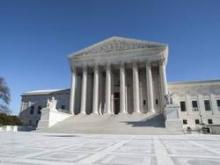Physicians are closely watching a U.S. Supreme Court case that could affect their ability to fight low Medicaid payments.
On Jan. 20, the justices will hear arguments in Armstrong v. Exceptional Child Center Inc., a legal dispute that centers on whether physicians and other health care providers have the right to sue states to compel them to raise Medicaid payment rates.
Allowing providers to seek legal action over low Medicaid payments helps to ensure that payment is adequate and that states are held accountable, according to Dr. Reid B. Blackwelder, board chair of the American Academy of Family Physicians. Under the equal access provision of the Medicaid Act, states that accept federal Medicaid funding are required to set reimbursement rates at levels sufficient to retain enough providers and make sure patients have proper access to care.
“States really have the freedom and the will to make [payment] decisions based on their budgets,” Dr. Blackwelder said in an interview. “We feel the only way to create a remedy to the state’s noncompliance [to the equal access provision] is the individual’s right to sue.”
The case stems from a 2009 lawsuit by Exceptional Child Center Inc. of Twin Falls, Idaho, and four other residential habilitation centers against Richard Armstrong, director for the Idaho Department of Health and Welfare. The centers claimed the state should have raised its Medicaid payment rates after studies determined rate increases were necessary. The Idaho Department of Health and Welfare and its Medicaid division had conducted yearly cost studies between 2006 and 2009, developed a new rate-setting methodology, and recommended substantial increases in reimbursement rates for supported living services, according to court documents. However, the new methodology and rate increases were not enacted for budgetary reasons.
A district court ruled in favor of the centers, and the 9th U.S. Circuit Court of Appeals affirmed the ruling. The state petitioned the Supreme Court to resolve the issue. Idaho noted a split among the lower courts as to whether the Constitution’s Supremacy Clause – which establishes the Constitution and federal law as the law of the land – supplies a private right of action to enforce Medicaid funding conditions against states. In a court brief, Idaho Attorney General Lawrence G. Wasden said the Supremacy Clause does not do so and that only Congress has the authority to enforce federal statutes.


